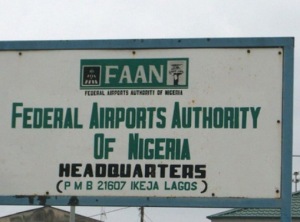This special report explores how the new Nigeria Revenue Service (Establishment) Bill could shake the financial foundations of key government agencies, grounding their revenue autonomy and testing the resilience of critical operations that millions of Nigerians rely on every day. Korede Abdullah, Africa Health Report Southwest correspondent sheds light on the development.
Financial Turbulence Ahead
When the Nigeria Revenue Service (Establishment) Bill was tabled, few anticipated the storm it would unleash across Nigeria’s revenue-dependent government agencies. For aviation giants like the Federal Airports Authority of Nigeria (FAAN), the Nigerian Civil Aviation Authority (NCAA), and the Nigerian Airspace Management Agency (NAMA), the loss of direct control over aviation levies and service charges threatens to clip their financial wings, leaving critical operations vulnerable amid turbulent skies.

These agencies collectively generate billions of naira annually from landing fees, passenger service charges, air navigation charges, and other levies — funds that sustain over 25 domestic airports, manage thousands of flights daily, and keep Nigeria’s airspace secure in a region notorious for security threats and infrastructural decay.
NRS Replaces FIRS, Reshapes Revenue Control
The Nigeria Revenue Service (NRS), established under the new Nigeria Revenue Service (Establishment) Bill, has effectively replaced the Federal Inland Revenue Service (FIRS) as Nigeria’s chief tax and revenue-collecting body.
Unlike the FIRS, which focused primarily on federal tax administration, the NRS is designed to centralize and coordinate a broader range of government revenue streams, including levies and charges previously collected directly by various Ministries, Departments, and Agencies (MDAs).
According to the Federal Government, the shift aims to curb leakages, boost accountability, and increase the federal purse, but has sparked concerns among affected MDAs over losing financial autonomy and the operational flexibility once funded by their internally generated revenue.
The End of Revenue Autonomy
The new bill centralizes revenue collection under the Nigeria Revenue Service (NRS), stripping 63 MDAs of their long-held authority to independently collect fees, taxes, and levies. For decades, FAAN, NCAA, and NAMA have relied heavily on internally generated revenue (IGR) to fund essential services like runway maintenance, airspace surveillance, and safety audits.
Aviation economist Dr. Olumide Arowolo warns, “This bill effectively cuts off the agencies’ financial lifeblood and leaves them at the mercy of bureaucratic federal allocations, which may not be timely.”
Analysts argue that under the existing system, some agencies retain up to 80% of their IGR to cover operational costs, while the balance goes to the Consolidated Revenue Fund. The new arrangement removes this flexibility, creating uncertainty about how funds will be disbursed and whether allocations will match actual revenue collected.
Operational Fallout: Airports at Risk of Decay
Experts fear that reduced IGR will hit the heart of airport operations. Without direct access to landing fees, passenger service charges, and ticket sales taxes, FAAN could struggle to maintain Nigeria’s ageing airport infrastructure.
“Airport runways, navigational aids, and terminals require constant investment,” says airport infrastructure consultant Mrs. Funmi Ayodele. “Delays in federal disbursements could translate to potholes on runways, faulty airfield lighting, and grounded equipment, risking passenger safety.”
Already, many Nigerian airports face recurring power outages, poor baggage handling systems, and leaking roofs. The fear is that without predictable cash flow, FAAN may be forced to defer critical repairs and upgrades, undermining efforts to position Nigeria as an aviation hub for West and Central Africa.
Airspace Management: Safety Nets Could Weaken
NAMA’s crucial role in managing Nigeria’s crowded airspace may also suffer under the new regime. Without guaranteed IGR from air navigation charges and service fees, the agency may lack funds to upgrade radar systems or retain skilled air traffic controllers.
An aviation security expert, Group Capt. John Ojikutu (Rtd), argues: “NAMA already operates on a thin budget. If the NRS delays allocations or allocates less than what NAMA independently collects, the knock-on effect could be disastrous for air safety.”
Nigeria’s airspace covers vast, busy corridors connecting Africa to Europe and the Americas. Any disruption in radar upgrades, maintenance of communication towers, or payment of allowances for overstretched air traffic controllers could heighten risks of mid-air incidents, near-misses, and delays, with reputational damage to the entire aviation sector.
Customs and Immigration: Stuck at the Border
Beyond aviation, the Nigeria Customs Service (NCS) and Nigeria Immigration Service (NIS) face similar dilemmas. Customs duties and border inspection fees fund a large portion of their operations, from patrol vehicles to scanner procurement. Akinwunmi Salami, a trade analyst, notes, “If these agencies have to wait months for releases from the NRS, smuggling and porous borders could worsen. These agencies are service-driven, not profit-driven — cash flow is survival.”
Africa Health Report (AHR) findings show that customs generates over ₦2 trillion annually, accounting for nearly a quarter of Nigeria’s non-oil revenue. The Immigration Service, meanwhile, depends on passport fees, visa charges, and border post fees to maintain over 1,000 border crossings. Any funding gap could weaken border patrols, hamper anti-smuggling operations, and leave Nigeria’s borders more vulnerable to illegal migration and trafficking.
Food Security Threat: Produce Inspection in Limbo
The Federal Produce Inspection Service (FPIS), which depends on export inspection levies to monitor agricultural exports, may also hit financial turbulence.
Agricultural economist, Dr. Kayode Olayanju, while speaking with this newspaper explains: “Revenue from cocoa, sesame, and other produce inspections funds quality checks and pest controls at ports. If inspections stall due to lack of funds, exporters will face delays, and Nigeria’s produce could be rejected on the global market.”

Nigeria’s agricultural exports are worth over $2 billion annually, with cocoa alone accounting for more than 20% of non-oil exports. Any lapse in inspection or certification could result in shipment rejections by strict European and Asian buyers, damaging the country’s reputation as a reliable supplier and threatening farmers’ livelihoods in states like Ondo, Cross River, and Taraba.
Regulatory Focus vs. Financial Reality
Proponents argue that stripping MDAs of revenue collection will sharpen their regulatory focus and curb internal leakages. Aviation policy analyst, Capt. Samuel Caulcrick, supports this view partially.
“It’s true NCAA could better enforce safety regulations if freed from revenue distractions,” he says. “But we must separate statutory and non-statutory charges carefully — otherwise, the NCAA’s operational backbone could collapse,” he added.

The NCAA plays a dual role — not just regulating airlines, but funding training, safety audits, and compliance inspections with its IGR. Misalignment in funding could weaken oversight at a time when Nigeria seeks to recover its Category 1 safety rating from the US Federal Aviation Administration and attract more international airlines.
Transition Headwinds: Resistance and Uncertainty
With implementation looming, resistance is growing. A retired NCAA director, who requested anonymity, warns of looming friction: “Many MDAs will resist relinquishing their revenue pipelines. Some staff fear job losses. The federal government must roll out detailed transition plans, retrain staff, and ensure that these agencies can still deliver on their core mandates without delays or politicking.”
Organised labour unions within agencies like Immigration and FAAN have already signalled concerns over redundancies in revenue collection units, potentially setting the stage for industrial actions. Experts also question whether the NRS has the manpower and technology to handle the sudden influx of multiple revenue streams while maintaining the same level of efficiency across diverse sectors.
A Balancing Act: Will the NRS Deliver?
In theory, the NRS could plug revenue leakages, expand Nigeria’s fiscal base, and ensure fairer allocation of funds. But if poorly managed, experts warn, the bill may unleash a wave of funding gaps, weakened oversight, and deteriorating public services.
As Dr. Arowolo aptly sums it: “Centralisation is good for transparency — but without efficiency, agencies may be grounded before they can take off again.” Whether the NRS can balance accountability with agility remains the billion-naira question.
For Nigeria’s MDAs, the coming months will test their resilience, their ability to adapt, and the federal government’s readiness to ensure that no essential agency is starved of funds at a time when citizens expect safe skies, secure borders, and a robust, diversified economy.



Explore the world of BitStarz, claim your welcome bonus of 5 BTC and 180 free spins, awarded Best Casino multiple times. Stay connected through official mirror.
1win Aviator official app – tested and verified
Casino mirror saves your time and login sessions